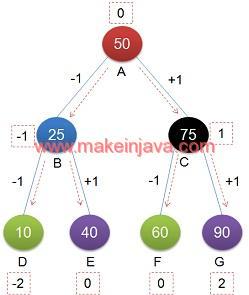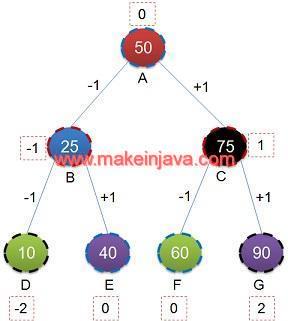- Given a binary tree, print binary tree in vertical order using recursive algorithm.
- Traverse binary tree vertically using depth first search (dfs) algorithm.
- The nodes, which are at same vertical distance, are said to be on same vertical path.
- The root node is assumed to be at vertical distance of 0.
- When, we traverse left subtree, we decrements the distance by 1.
- When, we traverse right subtree, we increment the distance by 1.
- The application of vertical order traversal is Find a vertical order sum in a Binary Tree
Example 1: find vertical distance of nodes in binary tree using java

- Root node A is at distance 0
- Node B is left child of node A
- Distance of B Node is decremented by 1.
- Node B is at vertical distance -1
- Distance of B Node is decremented by 1.
- Node C is right child of node A
- Distance of C Node is incremented by 1, (0 + 1) so it becomes 1
- Node C is at vertical distance 1
- Distance of C Node is incremented by 1, (0 + 1) so it becomes 1
Example 2: Vertical order distance of binary tree in java
- Node A is at distance 0
- Node B is left child of Node A
- Node B is at vertical distance -1
- Node D is left child of Node B (Node B is at distance -1)
- Node D is at vertical distance -2
- Node E is right child of Node B (Node B is at distance -1)
- Node E is at vertical distance 0 (-1 + 1 = 0)
- Node C is right child of Node A (at vertical distance 0)
- Vertical distance of Node C is 1
- Vertical distance of Node F is 0
- Vertical distance of Node G is 2

Algorithm to find vertical distance in a binary tree using java
- Initialize the distance 0 for root node
- Create a HashMap of Vertical distance and List of nodes
- Map<Integer, List<Integer>> mapVerticalDistance
- Perform the pre order traversal of binary tree
- If, hashmap does not contains distance
- Add distance and node value to hashmap
- else, update for hashmap for corresponding distance
- Perform traversal for left child of
- Decrements the distance by -1 & traverse binary tree
- Perform traversal for right child of
- Increment the distance by 1 & traverse binary tree.
- If, hashmap does not contains distance
- At end of recursive operation, we would get vertical distance of all nodes.

Time complexity of algorithm is O(n).
Program – Vertical order traversal of a binary tree (recursive) using java
1.) VerticalOrderOfBTree class:
- VerticalOrderOfBTree class is responsible, for printing the binary tree in vertical order.
package org.learn.Question;import java.util.ArrayList;import java.util.HashMap;import java.util.List;import java.util.Map;public class VerticalOrderOfBTree { private static Map<Integer, List<Integer>> mapVerticalDistance = null; private static void verticalOrder(Node root, int distance) { if (null == root) return; List<Integer> list = null; if (mapVerticalDistance.containsKey(distance)) { list = mapVerticalDistance.get(distance); } else { list = new ArrayList<Integer>(); } list.add(root.data); mapVerticalDistance.put(distance, list); verticalOrder(root.left, distance - 1); verticalOrder(root.right, distance + 1); } public static void verticalOrderOfBTree(Node root) { if (null == mapVerticalDistance) { mapVerticalDistance = new HashMap<Integer, List<Integer>>(); } else { mapVerticalDistance.clear(); } verticalOrder(root, 0); mapVerticalDistance .forEach( (k, v) -> System.out.println("Nodes at distance " + k + " = " + v)); }} |
2.) Node Class:
- Node class is representing the nodes of a binary tree.
package org.learn.Question;public class Node { public int data; public Node left; public Node right; public Node(int num) { this.data = num; this.left = null; this.right = null; } public Node() { this.left = null; this.right = null; } public static Node createNode(int number) { return new Node(number); }} |
3.) App Class:
- We are constructing the binary tree in main method.
- We are calling VerticalOrderOfBTree class to print binary tree in vertical order.
package org.learn.Client;import org.learn.Question.Node;import org.learn.Question.VerticalOrderOfBTree;public class App { public static void main(String[] args) { // root level 0 Node A = Node.createNode(50); // Level 1 Node B = Node.createNode(25); Node C = Node.createNode(75); // Level 2 Node D = Node.createNode(10); Node E = Node.createNode(40); Node F = Node.createNode(60); Node G = Node.createNode(90); // connect Level 0 and 1 A.left = B; A.right = C; // connect level 1 and level 2 B.left = D; B.right = E; C.left = F; C.right = G; VerticalOrderOfBTree.verticalOrderOfBTree(A); }} |
Output – vertical order traversal of binary tree using java
Nodes at distance 0 = [50, 40, 60]Nodes at distance -1 = [25]Nodes at distance -2 = [10]Nodes at distance 1 = [75]Nodes at distance 2 = [90] |
Download Code – print binary tree in Vertical Order (DFS)
